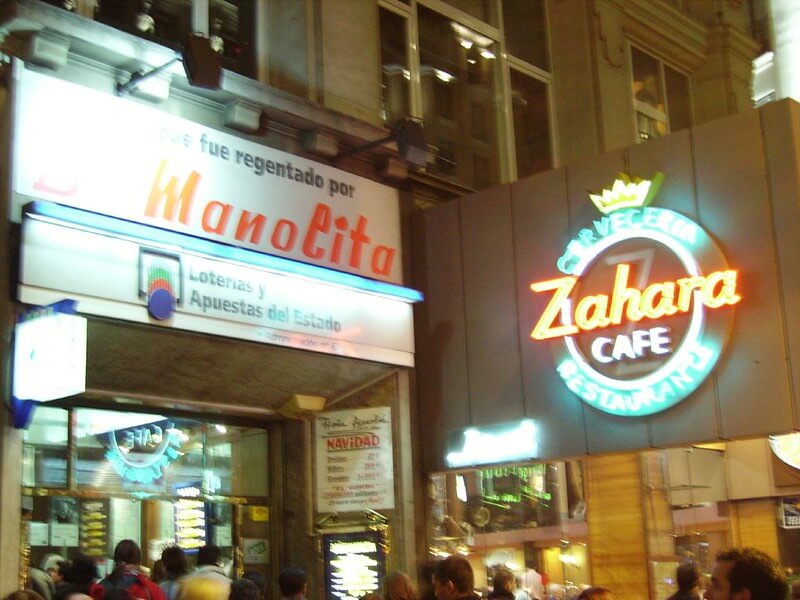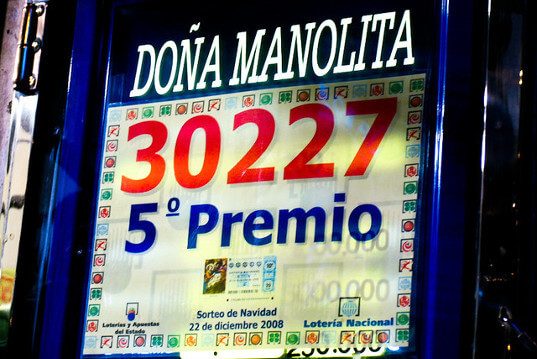
This is the English transcription of the video above. Miguel explains an important event in the Spanish calendar: El Gordo, the national Christmas lottery. If you just want to listen to the Spanish audio track, for example while driving, cooking, or doing the laundry, you can find it on Soundcloud.
Below is a more detailed blog entry.
Transcription
Hi! Today we want to tell you about one of the events of the year that we Spaniards look forward to most enthusiastically: the national Christmas lottery that we commonly call “el Gordo”.
It is called that because in the past it was a chubby character who promoted this Christmas lottery.
Lots of people line up to buy lottery tickets on these dates. Look at these people: they are probably thinking “I hope I win”.
If you win “El Gordo”, which is the first prize, you win 400,000 euros. And many times co-workers or groups of neighbours share a ticket.
Lottery day is very exciting. Click below to read more details on our blog.
We also have exciting news in Real Spanish. We’re going to give you a present: two complete mini-lessons. You can get: “Nos ponemos morados”: Cómo celebramos la Navidad” and “¡No seas aguafiestas!”: Cómo celebramos la Nochevieja y los Reyes Magos— completely free!
Bye! And happy holidays!
Próximos estrenos: El 10 de diciembre, puedes conseguir gratis una minilección sobre la Navidad en el mundo hispánico. Y el 17 de diciembre, otra sobre el año nuevo y el Día de los Reyes. Cada mini-lessión consta de un vídeo, una transcripción anotada, un hoja de gramática y algunos ejercicios interactivos. Síguenos en YouTube para recibir notificaciones.
Around this time every year, people in Spain wait eagerly for the 22nd of December, the date of the special Christmas lottery under the auspices of the state organization Loterías y Apuestas del Estado.
This lottery first took place on December 18, 1812 in Cádiz, but it wasn’t named the Christmas Lottery until 1892.

This lottery takes place in the Teatro Real or the Palacio de Congresos in Madrid and crowds of people attend. Children from San Ildefonso school, one of the oldest in Madrid with more than 400 years of history, practise singing out the winning numbers. One child takes out a numbered ball from a rotating drum and the other takes out of another drum ball that announces the prize for that number.
The first prize is known as El Gordo (The Big One) and the winner receives 400,000 euros. The ticket with the number is known as el decimo (one tenth), because each number appears on ten different tickets: that is, there are ten tickets with the same number. There are four other prizes as well as El Gordo, worth from 125,000 euros (second prize) to 6,000 euros (fifth prize). Then there is what’s known as La Pedrea, consisting of lots of smaller prizes.


Crowds of people queue up at the lottery offices to buy tickets, which cost 20 euros each. The most famous place to buy tickets is Doña Manolita, en Madrid, which started in 1904 and became very popular because so many of the tickets sold there won prizes.
Many people buy shares in a ticket; that is, a ticket is shared among friends and family. Sometimes local businesses sell shares to their customers. The cost of shares is much lower and the prizes are shared among all the participants.
The television advertisement of the lottery is also interesting, with many moving stories which encourage solidarity. The message is: “The best prize is sharing.”
If you are in Spain now, why not try your luck by buying a ticket or a share? Share the dream!
Links to articles and videos:
General information: https://es.wikipedia.org/wiki/Sorteo_Extraordinario_de_Navidad
Article on the lottery announcement:
https://elpais.com/cultura/2019/11/14/television/1573726006_744458.html
Full video of the 2018 Draw:
Video of the 2018 announcement:
http://www.rtve.es/alacarta/videos/loteria-de-navidad/anuncio-loteria/4839403/
Video of the 2015 announcement:

